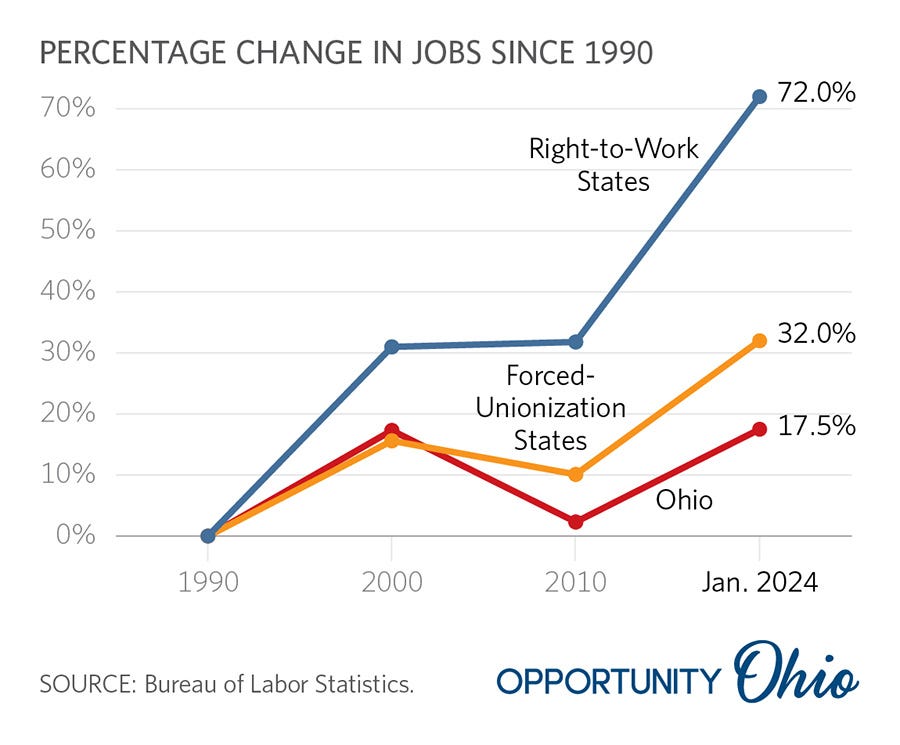What Does Big Labor's Win in Right-to-Work Tennessee Organizing a VW Manufacturing Plant Mean?
Shawn Fain just may end up being the dog that caught the car. With the car's bumper in his mouth, hopefully he won’t be able to bark much.
It wasn’t coincidental that United Auto Workers (UAW) head Shawn Fain targeted a VW plant where it had tried twice already to organize workers. It appears the third time was the charm. More importantly, of all the foreign automakers, VW is the least hostile to unions, as workers at their facilities in Germany and outside of America are represented by trade unions and work councils. VW management is comfortable working with unions, so they are not as aggressive as the other foreign automakers in fighting union organizing efforts. When the UAW successfully wins an organization effort at a Honda or Toyota plant, it will be a sign of true union strength.
In the short term, the UAW’s big win organizing a VW manufacturing plant in right-to-work Tennessee means Fain's strategy of getting expensive new contracts with the Big Three automakers has legs beyond forced unionized states. I wouldn’t be surprised if Fain’s off-the-record discussions with the heads of General Motors, Ford, and Stellantis during contract negotiations didn’t include a conversation in which he relayed to them that big contracts with them would give him enormous leverage to organize the foreign automakers down South, which would be in the Big Three’s interest in order to reduce the competitive advantage those right-to-work manufacturing plants have. As labor leader Gay Henson noted, “[S]he had noticed a change in some workers’ views about unions as they see their counterparts at other companies win big pay raises.” With Joe Biden’s inflation crushing Main Street Americans, the lure of big new raises via collective bargaining shouldn’t be dismissed easily. The vote in Tennessee wasn’t close, with 73% of the 4,300 workers voting in favor of the UAW.
When I ran for governor last year, I frequently made the point to union members that right-to-work would actually benefit them for the exact reason it helped the UAW organize the VW facility. Specifically, I noted that right-to-work would make Ohio more attractive thereby spurring the kind of explosive job growth that has occurred in right-to-work states (72% average job growth) over the last three decades. With Ohio’s tepid job growth (17.5% job growth), the competition for workers is low, which weakens the pressure for wage and benefit increases. As a result, even unionized workplaces see few benefits to unions given the weak hand they hold when collectively bargaining. In contrast, with robust job growth and competition for workers that comes with right-to-work status, unions have far greater leverage to extract wage and benefit increases lest their members opt to leave for companies willing to pay more in a competitive environment. With so many new manufacturing facilities in Tennessee due to its right-to-work status, watch how strong the UAW’s hand will be once it starts collecting bargaining with VW.
Theoretically, the UAWs win in Tennessee also should help Ohio and other forced union states appear equally competitive for new manufacturing facilities in the short term. I say, theoretically, because the governors and automakers in right-to-work states won’t sit idly by as the UAW tries to unionize more facilities. Fain’s win just may be short-lived.
The long-term upsides, however, aren’t as bright.
First, Biden’s asinine push to eliminate internal combustion engine (ICE) vehicles in favor of electric vehicles (EV) will drive the cost of those vehicles higher in the coming years. Many Americans will opt to keep their ICE cars longer instead of buying expensive and unreliable EVs. Demand for new vehicles, therefore, will decrease, which will hurt UAW workers whose expensive contracts depend on the Big Three doing financially well.
Next, try as they might to kill it, competition from China and Mexico will remain. That competition will continue to make unionized manufacturing plants far more expensive to operate than plants in Mexico and vehicles from China. Keep in mind, America is entirely dependent on China for the processed precious metals needed for EV, solar, and wind batteries. Thus, any attempt to block China from accessing America’s auto market will be met by a trade war that involves the materials the Left desperately needs for its forced transition from carbon to non-carbon energy. Three dimensional chess is not their strongest suit.
Finally, and, most importantly, the UAW’s victory in Tennessee unequivocally shows that right-to-work doesn’t kill unions, which will undermine Big Labor’s talking points against right-to-work laws. As I preached, right-to-work merely forces Big Labor to show workers the tangible value being a union member brings to them. As employers in right-to-work states react to the Tennessee UAW victory by increasing wages and benefits, the UAW’s attractiveness will decline. Why pay union dues when you already are getting what the unionized workers are getting? Contrary to Big Labor’s incessant claims that being anti-union is all about wages and benefits, most employers oppose unionized workplaces for the simply fact that they need to control their operations in a globally competitive market in which just in time inventory requires enormous levels of flexibility and creativity. Union contracts that run 1,000-pages are the antithesis of both flexibility and creativity.
Time will tell, but Fain just may end up being the dog that caught the car. With the car's bumper in his mouth, hopefully he won’t be able to bark much.
P.S. In case you missed it (which you did unless you live in Ireland), here is a segment I did on Irish National Radio discussing the lawfare case against Donald Trump in New York City that started earlier this week.




